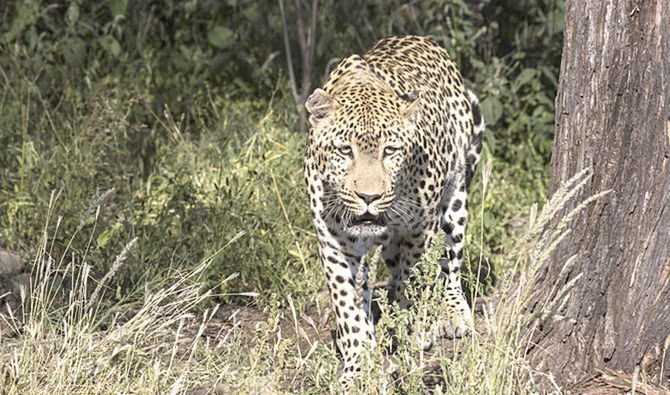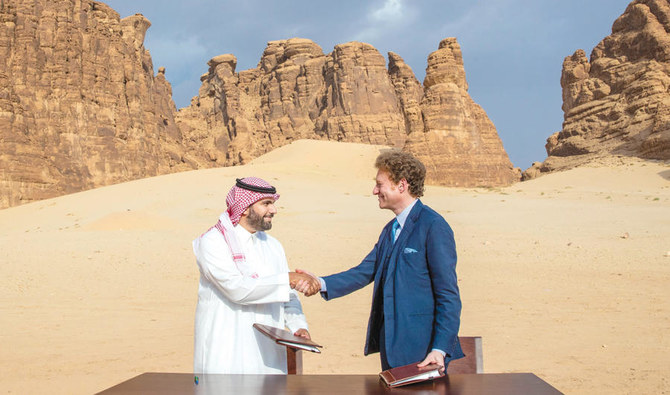JEDDAH: A $20 million deal to save Arabian leopards has been signed between the Royal Commission for Al-Ula (RCU) and Panthera, the global wild cat conservation organization.
The Arabian leopard population is critically endangered, meaning it faces an extremely high risk of extinction in the wild, according to the definition provided by the International Union for Conservation of Nature.
Panthera President Dr. Fred Launay said the Arabian leopard subspecies was estimated to number fewer than 200 in the wild, with its population driven down in recent years due to loss of habitat and prey, followed by persecution in livestock areas.
The signing ceremony was held at Ashar in Al-Ula county.
The RCU will join The Global Alliance for Wild Cats with a commitment to investing more than $20 million over the next 10 years to conservation measures, with a focus on the Arabian leopard, which is indigenous to Al-Ula.
Prince Badr bin Abdullah bin Farhan, the minister of culture and RCU governor, said: “The signing of the agreement is a major milestone in our shared ambitions to reintroduce the Arabian leopard population in the region and join global partners to support the preservation of these wild cat populations worldwide.
“It is our duty to protect, conserve and build the population numbers to preserve the species from becoming a footnote of history.
“Our partnership with Panthera will help ensure that populations in other countries around the world are preserved before they reach the levels of endangerment faced today by our precious native big cats.”
RCU CEO Amr Al-Madani said that Al-Ula was chosen as the venue for signing the deal because the conservation of the Arabian leopard was a major part of the commission’s commitment to helping protect, enhance and develop wildlife in the region.
HIGHLIGHTS
• The Royal Commission for Al-Ula will join The Global Alliance for Wild Cats with a commitment to investing more than $20 million over the next 10 years to conservation measures, with a focus on the Arabian leopard, which is indigenous to Al-Ula.
• Panthera, founded in 2006, is devoted exclusively to preserving wild cats and their critical role in the world’s ecosystems.
• Both the royal commission and Panthera share a deep-rooted passion for conservation.
“Arabian leopards were native to the Al-Ula area in the recent past alongside other species and we are committed to investing in breeding programs to help increase their numbers with the aim of eventually being able to reintroduce them back into their natural habitat,” he told Arab News.
“The RCU has created the Sharaan Nature Reserve to provide a sanctuary for the protection, preservation and reintroduction of endangered species native to Saudi Arabia and plans to develop further protected areas in the county.
“Our ambition is to create thriving, ecologically rich environments that can support big cat species such as the Arabian leopard.
“Our partnership with Panthera — a global authority in the preservation of big cat species worldwide — will help us achieve this.”
There will be a global fund focused on the protection and enhancement of remaining wild populations, captive breeding programs, international collaborations, community-based conservation projects and scientific research to support the future of this rare species.
“Being able to create a future where magnificent Arabian leopards can once more roam freely within the Sharaan Nature Reserve we are developing is one that we cannot wait to see. Such a beautiful natural landscape as Al-Ula is a fitting home for some of the world’s most magnificent animals,” he added.
Panthera Chairman Dr. Thomas Kaplan said the launch of the Arabian Leopard Initiatives (ALI), announced by the RCU, was proof that individuals could alter the trajectory of a species away from extinction and toward rebirth.
“I am particularly grateful that the RCU has not only chosen to invest in bringing back the Kingdom’s own leopards, but has also joined — together with Indian, Chinese, Emirati, and American partners – in Panthera’s Global Alliance for Wild Cat,” he told Arab News.




























